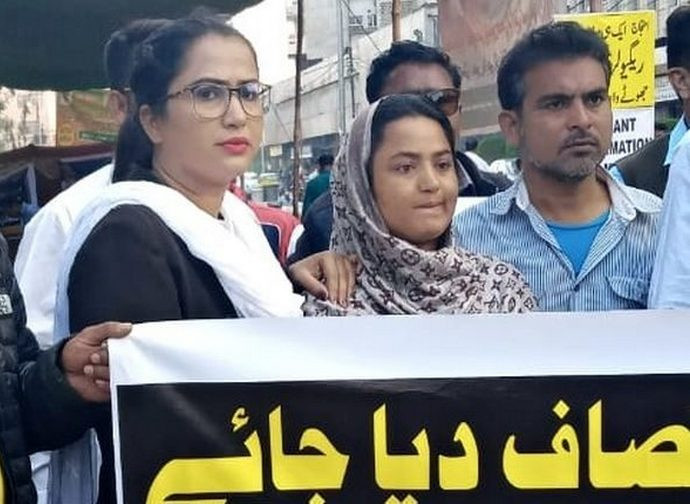Pakistan: Forced marriages of Christian minors continue despite new law
Every year in Pakistan, over a thousand girls are kidnapped, forcibly converted to Islam and married off to adult Muslim men. This is a scourge that the government is failing to address adequately and which deserves the attention of the international community.

In Pakistan, many minority Christian girls experience systemic threats of abduction, forced religious conversion, and marriage to Muslim men, usually at a very tender age. As the disturbing trend of forced marriages seriously breaches the freedom of these young Christian Pakistani girls to practise Christianity and choose their spouses, Catholics who uphold the sanctity of marriage as well as the role of Christianity in society should be rightfully outraged at such abuses.
The case study of Shahida Bibi, forcibly converted and married as a child to a Muslim man, is one among many such instances that mirrors such injustices and violations to the free practice of Christianity in Pakistan. Bibi was only 11 when her mother eloped with a Muslim man who then “gave” her to his brother, Shehzad Akhtar Khan, who sexually exploited Bibi and, after she turned 18, coerced her to enter into an Islamic marriage, or Nikah.After suffering for many years under duress and trauma, a Pakistani civil court finally annulled Bibi’s “marriage” and reinstated her Christian identity in 2025.
The judge directed the National Database and Registration Authority (NADRA) to make a fresh identity card for Bibi, restoring her religious status as Christian and deleting her marital status,” Bibi’s attorney, Lazar Allah Rakha, told Christian Daily International-Morning Star News earlier this year. While Bibi attained a significant judicial victory, the fact that her case, as well as many others, even happened, showcases just how deep-rooted such abuses of forced “marriages” are in Pakistani society.
For years, international specialists at the United Nations (UN) have routinely denounced the practice of such forced “marriages”often involving the abduction and sexual assault of Christian girls, along with their forced conversions to Islam and “marriages” to Muslim men. Unfortunately, this disturbing trend is not merely limited to Pakistan. A March 2025 article by Premier Christian News stated the following: “According to UNICEF, 100 million girls worldwide are at risk of forced child marriage over the next decade, with girls from religious minorities facing an even greater threat of coercion into both marriage and religious conversion. ADF International reports that Pakistan, a Muslim-majority country, sees more than 1,000 girls from minority communities forcibly converted to Islam and married each year. Many victims are unable to escape due to threats against them and their families.”
Adding, the same Premier Christian Daily article said: “In January 2025, the European Union issued a warning over the country’s human rights - including blasphemy laws, forced conversions and religious persecution.”
Admittedly, the alarming trend of forced marriages between visibly young Christian girls and older Muslim men in Pakistan is a tragic abuse of power imbalances as well as a grave breach on the dignity of these Christian girls, created in God’s image and likeness. Besides a regrettable loss in the Christian identity (at least outwardly) of these girls, physical and psychological trauma are not uncommon, particularly if these “marriages” involve sexual abuse and exploitation. The offspring of such “marriages” may also suffer from health issues related (or not) to abusive family dynamics, such as in the case of Bibi’s disabled child who perished at a tender age.
Nonetheless, despite activist groups like the Alliance Defending Freedom (ADF) International, as well as recent legal reforms, such as the Islamabad Capital Territory Child Marriage Restraint Bill criminalizing underage marriage, socio-cultural pressures, inconsistent implementations and legal gaps, impede tangible progress in preventing more girls from falling prey to abduction and forced religious conversion. For instance, forced conversions to Islam, is usually perceived by certain sectors of Pakistani society as a pious and rewarding act. This belief sustains a social environment where such conversions are justified or even applauded despite the coercion involved. Conversion is sometimes seen as a service to religion, regardless of the means used to achieve it.
What is more, the ineffective approach of successive Pakistani administrations in tackling the problem of forced “marriages” certainly raises eyebrows. Even the left-leaning London School of Economics (LSE) published the following commentary on its blog, criticizing the Pakistani government: “Unfortunately, the government is taking a rather long time to understand the problem which is causing a huge damage to the country’s reputation. We are all familiar with the fact that this crisis is a product of the government’s failure over decades to protect the religious minorities from abuses by the non-state actors and religiously inspired extremists. On the other hand, the incidents of hate preach, and religious extremism remains an imminent threat for minority communities particularly girls from the Hindu and Christian faiths.”
In view of such grim circumstances, it is imperative that Catholics all around the world, as well as the larger international community, rally together to demand justice for these victims of forced “marriages”. Unrelenting prayer as well as courageous advocacy at the local and international levels are good steps in the right direction to nip this somber reality in the bud.
